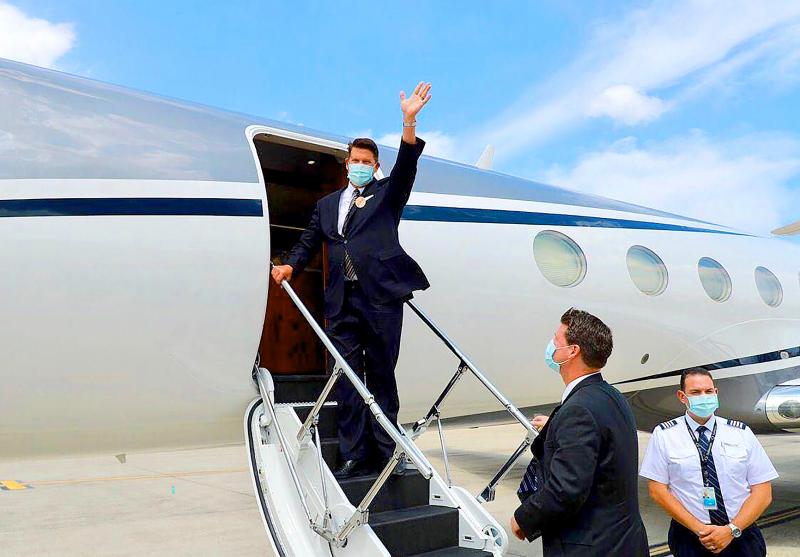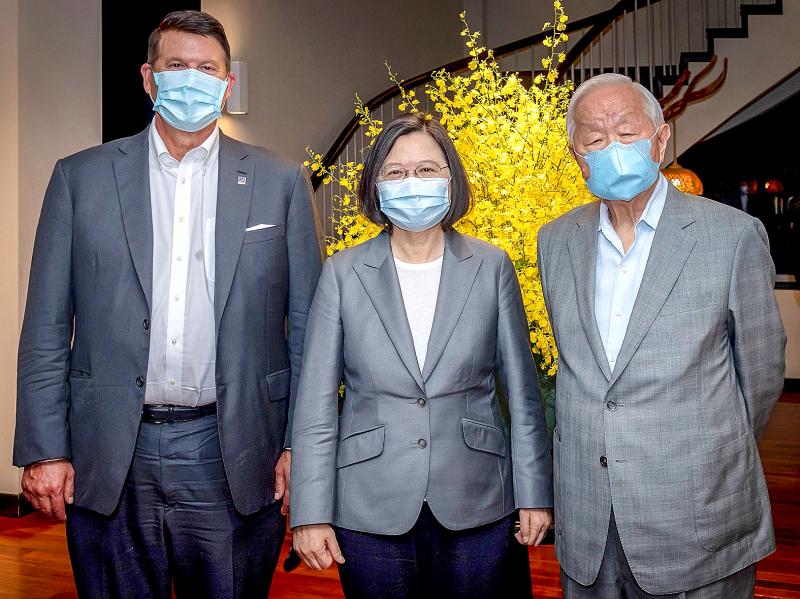A delegation led by US Undersecretary of State for Economic Growth, Energy and the Environment Keith Krach yesterday ended their visit, with the government saying that Taiwan and the US would continue to bolster economic ties.
After arriving in Taiwan on Thursday afternoon, the delegation yesterday attended a memorial service for former president Lee Teng-hui (李登輝) and exchanged opinions with high-ranking officials and members of different sectors over various issues, the Ministry of Foreign Affairs said.
Krach is the highest-ranking US Department of State official to visit Taiwan since the two nations cut relations in 1979, it said.

Photo provided by the Ministry of Foreign Affairs via CNA
Based on discussions with the group, the government would continue to work with the US to strengthen economic ties and bilateral partnerships, it added.
After hosting an evening banquet with delegation members at the presidential residence on Friday, President Tsai Ing-wen (蔡英文) posted several photographs of the meeting on Facebook, which showed that Taiwan Semiconductor Manufacturing Co (台積電) founder Morris Chang (張忠謀) also attended the dinner.
They were joined by Vice Premier Shen Jong-chin (沈榮津), Minister of Economic Affairs Wang Mei-hua (王美花), National Security Council Secretary-General Wellington Koo (顧立雄) and Minister Without Portfolio John Deng (鄧振中).

Photo: AFP / Presidential Office
Tsai wrote on Facebook that they had in-depth exchanges, adding that she hopes for additional dialogue.
Most of the US delegation’s meetings were held behind closed doors, unlike last month’s visit from a delegation led by US Secretary of Health and Human Services Alex Azar.
Keeping Krach’s meetings low-profile was not entirely Taiwan’s choice, a source familiar with the matter said, adding that there were some communications between agencies in Washington.
The Office of the US Trade Representative, which manages trade discussions, was viewing the visit closely, and might decide Taiwan has not made enough concessions or be watching how it resolves a disagreement over US pork imports containing ractopamine residues, they said.
The office might also be concerned if Krach’s delegation made too many commitments to Taiwan that create obstacles to future trade negotiations, they added.
Krach’s visit to Taiwan is already a diplomatic breakthrough, showing that Taiwan and the US can have more direct and closer communication, Democratic Progressive Party Legislator Wang Ting-yu (王定宇) said.
Prior to the administration of US President Donald Trump, Taiwan’s affairs were rarely a priority for the US, and Washington often viewed Taiwan through the lens of Beijing, he added.
After Krach commenced “preparatory talks” for the Taiwan-US Economic and Commercial Dialogue, other US officials might visit, he said.
Meanwhile, Chang’s attendance at the banquet showed that Taiwan could play a vital role in the US’ plans to promote its 5G Clean Path initiative and restructuring supply chains related to information technology, Wang added.

Conflict with Taiwan could leave China with “massive economic disruption, catastrophic military losses, significant social unrest, and devastating sanctions,” a US think tank said in a report released on Monday. The German Marshall Fund released a report titled If China Attacks Taiwan: The Consequences for China of “Minor Conflict” and “Major War” Scenarios. The report details the “massive” economic, military, social and international costs to China in the event of a minor conflict or major war with Taiwan, estimating that the Chinese People’s Liberation Army (PLA) could sustain losses of more than half of its active-duty ground forces, including 100,000 troops. Understanding Chinese

The Ministry of Foreign Affairs (MOFA) yesterday said it is closely monitoring developments in Venezuela, and would continue to cooperate with democratic allies and work together for regional and global security, stability, and prosperity. The remarks came after the US on Saturday launched a series of airstrikes in Venezuela and kidnapped Venezuelan President Nicolas Maduro, who was later flown to New York along with his wife. The pair face US charges related to drug trafficking and alleged cooperation with gangs designated as terrorist organizations. Maduro has denied the allegations. The ministry said that it is closely monitoring the political and economic situation

UNRELENTING: China attempted cyberattacks on Taiwan’s critical infrastructure 2.63 million times per day last year, up from 1.23 million in 2023, the NSB said China’s cyberarmy has long engaged in cyberattacks against Taiwan’s critical infrastructure, employing diverse and evolving tactics, the National Security Bureau (NSB) said yesterday, adding that cyberattacks on critical energy infrastructure last year increased 10-fold compared with the previous year. The NSB yesterday released a report titled Analysis on China’s Cyber Threats to Taiwan’s Critical Infrastructure in 2025, outlining the number of cyberattacks, major tactics and hacker groups. Taiwan’s national intelligence community identified a large number of cybersecurity incidents last year, the bureau said in a statement. China’s cyberarmy last year launched an average of 2.63 million intrusion attempts per day targeting Taiwan’s critical

‘SLICING METHOD’: In the event of a blockade, the China Coast Guard would intercept Taiwanese ships while its navy would seek to deter foreign intervention China’s military drills around Taiwan this week signaled potential strategies to cut the nation off from energy supplies and foreign military assistance, a US think tank report said. The Chinese People’s Liberation Army (PLA) conducted what it called “Justice Mission 2025” exercises from Monday to Tuesday in five maritime zones and airspace around Taiwan, calling them a warning to “Taiwanese independence” forces. In a report released on Wednesday, the Institute for the Study of War said the exercises effectively simulated blocking shipping routes to major port cities, including Kaohsiung, Keelung and Hualien. Taiwan would be highly vulnerable under such a blockade, because it